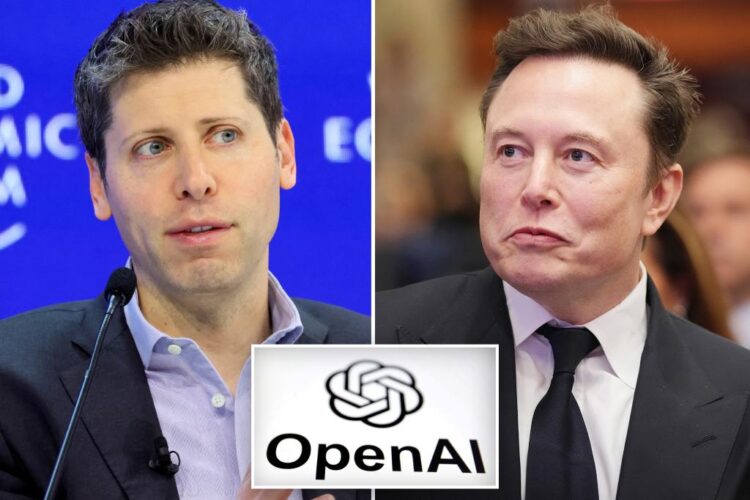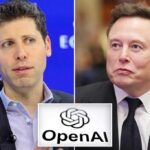Elon Musk seeks injunction to block OpenAI’s plans to become profitable ‘Frankenstein’: filing

Elon Musk has filed for an injunction against OpenAI, alleging that the company has strayed from its original mission of benefiting humanity and is now transforming into what he calls a “profit-driven Frankenstein.” The legal action intensifies a growing feud between Musk and the artificial intelligence giant he helped co-found in 2015.
- Netflix Users Warned of ‘Scary’ Scam That Could Steal Credit Card Information
- Meta Plans to Build World’s $10 Billion Undersea Internet Cable: Report
- Apple’s New AI Could Leak Sensitive Data, Experts Warn – Take These Steps to Protect Your Privacy
- Google Chrome users warned never to click on these websites – 8 telltale signs of a scam and tips to avoid
- The lame-duck Biden administration lends $6.6 billion to Tesla rival Rivian
The court filing claims that OpenAI’s recent business maneuvers—especially its partnerships and profit-oriented strategies—violate the nonprofit principles that guided its creation. Musk’s latest move signals not only a legal confrontation but also a broader philosophical clash over how artificial intelligence should evolve in the hands of private corporations.
Development
According to the filing, Musk argues that OpenAI’s leadership, particularly CEO Sam Altman, has prioritized commercial success over the organization’s founding pledge to advance AI “for the benefit of humanity.” The injunction aims to halt any further steps toward monetizing OpenAI’s technology until the court reviews the alleged deviations from its charter.
- The lame-duck Biden administration lends $6.6 billion to Tesla rival Rivian
- Google Chrome users warned never to click on these websites – 8 telltale signs of a scam and tips to avoid
- Elon Musk slams California Gov. Gavin Newsom for ‘crazy’ move to exclude Tesla from rebate plan
- Elon Musk Tesla’s $56 billion pay package rejected again by Delaware judge
- Embarrassed Spotify Users Vow to Hack Their ‘Wrapped’ Results – They’d ‘Rather Be in Jail’ Than Reveal the Truth
Musk’s legal team describes OpenAI’s current direction as a “corporate mutation,” alleging that the company’s partnership with Microsoft and its licensing of AI products like ChatGPT and GPT-4o for enterprise use represent a betrayal of its nonprofit roots. He contends that OpenAI has turned into “a closed-source, profit-maximizing entity under the control of the world’s largest technology corporations.”
The injunction seeks to pause new commercial agreements and revenue-sharing initiatives while the court determines whether OpenAI’s board breached its founding mission. Sources close to the case suggest Musk may also request transparency measures, demanding that internal research and model data be disclosed to the public or a regulatory body.
OpenAI, in response, has publicly denied wrongdoing. In a brief statement, the company emphasized that its current structure includes a nonprofit oversight board that continues to supervise the organization’s direction. Representatives argue that OpenAI’s “capped-profit” model still aligns with its mission by enabling long-term research while sustaining operations through limited revenue.
Industry analysts note that the dispute extends far beyond legalities. It reflects two competing visions for the future of AI—one that treats it as a public good requiring strict ethical guardrails, and another that sees commercialization as essential for progress and sustainability. Musk’s use of the term “Frankenstein” underscores his belief that unregulated profit incentives could distort AI’s evolution into something potentially harmful or uncontrollable.
The outcome of this case could have significant implications for the global AI ecosystem. If Musk succeeds, it may set a precedent for how mission-driven tech organizations handle transitions toward profitability. Conversely, if OpenAI prevails, it could reinforce the legitimacy of hybrid models that blend innovation, ethics, and financial viability.
For now, the tech world watches closely as one of its most influential figures reignites a debate that began nearly a decade ago—whether artificial intelligence should serve as a collective human asset or a proprietary tool for corporate power.
FAQ – Frequently Asked Questions
- What is Elon Musk’s main complaint against OpenAI?
He claims that OpenAI has abandoned its nonprofit mission to benefit humanity and has instead evolved into a profit-oriented corporation driven by commercial interests. - What exactly is Musk asking the court to do?
He is seeking an injunction to block OpenAI from pursuing further profit-based initiatives until the court determines whether the company violated its founding principles. - Why did Musk refer to OpenAI as a “Frankenstein”?
He used the term metaphorically to describe what he sees as an uncontrolled transformation of OpenAI—from an altruistic research group into a profit-driven corporate entity. - What is OpenAI’s response to the lawsuit?
OpenAI denies any wrongdoing, asserting that its capped-profit structure allows it to fund research sustainably while staying true to its broader mission. - How does Microsoft factor into this dispute?
Musk’s filing criticizes OpenAI’s deep partnership with Microsoft, arguing that it gives a single corporation too much influence over powerful AI systems. - Did Elon Musk help create OpenAI?
Yes. He was one of the original founders and early funders in 2015 but left the board in 2018 due to conflicts of interest with Tesla’s own AI work. - What could happen if the injunction is approved?
OpenAI might have to pause certain business deals, licensing agreements, or revenue programs while the court examines the case. - How might this case affect the AI industry?
It could influence how AI organizations balance ethical commitments with commercial realities and could inspire new regulations for mission-driven tech entities. - Has OpenAI faced similar criticism before?
Yes. Since introducing ChatGPT and other paid services, critics—including former supporters—have questioned whether the company has become too profit-focused. - What happens next in the legal process?
The court will review Musk’s injunction request, after which both sides will present evidence and arguments before a judge decides whether to grant the order.
Elon Musk’s injunction against OpenAI represents more than a legal dispute—it’s a symbolic confrontation over the soul of artificial intelligence. His accusation that the company has become a “Frankenstein” encapsulates a growing anxiety within the tech community: that AI’s immense potential could be overshadowed by corporate greed and secrecy.
As the legal battle unfolds, it will test whether OpenAI’s hybrid model can truly balance innovation and integrity. Whatever the verdict, this case will shape the conversation about who controls the future of AI—and whether the technology designed to serve humanity can remain accountable to it.

